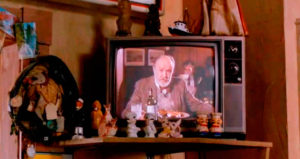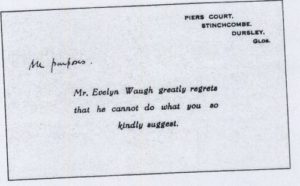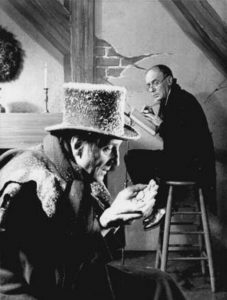Nostalgia is incommunicable. Try as we might, we cannot share it with those who stand outside the magic circle of common memories. So I can’t tell you what it really felt like for me to drive through the Great Smoky Mountains National Parkon Monday morning, or to walk along the main street of Gatlinburg, the Tennessee resort town where my family spent several of its summer vacations some forty-odd years ago. Even if you’d been with me, you wouldn’t have seen what I saw from the Sky Lift whose swinging yellow chairs look down on the town, or smelled what I smelled when I walked into the Ole Smoky Candy Kitchen in search of chocolate taffy logs. What I saw and smelled was, of course, myself when young, and you didn’t know me then…
Read the whole thing here.



 I was amusing myself on Twitter before turning off the light and going to sleep last Friday night, and had occasion to post this deliberately curmudgeonly sentiment: “For the gazillionth time: ‘No problem’ is NOT the correct reply to ‘Thank you very much.’”
I was amusing myself on Twitter before turning off the light and going to sleep last Friday night, and had occasion to post this deliberately curmudgeonly sentiment: “For the gazillionth time: ‘No problem’ is NOT the correct reply to ‘Thank you very much.’” • Nobody cares old man. Pour yourself another prune juice and lighten the fuck up.
• Nobody cares old man. Pour yourself another prune juice and lighten the fuck up. Several respondents, presumably in the name of intersectionality, played the race card:
Several respondents, presumably in the name of intersectionality, played the race card: • Hi, Terry. Kindly go jump up your own ass and pull your linguistic prescriptivism up there after you. No problem!
• Hi, Terry. Kindly go jump up your own ass and pull your linguistic prescriptivism up there after you. No problem! Above all, though, I was struck by the furious resentment that came boiling into my Twitter feed as a result of my casual observation, as well as by the assumptions implicit in this resentment. It was, lest we forget, a one-sentence tweet devoid of context. Nevertheless, many respondents seem to have taken it for granted that I was portraying a real-life encounter between a haughty middle-aged man of means (i.e., me) and a poorly paid millennial convenience-store clerk (i.e., them). And while hundreds of people earnestly assured me, some pleasantly and others less so, that there is no definitional difference between “No problem” and “You’re welcome,” I soon lost count of the responses which made it crystal-clear that there is, at least for these particular respondents, a huge and purposeful difference.
Above all, though, I was struck by the furious resentment that came boiling into my Twitter feed as a result of my casual observation, as well as by the assumptions implicit in this resentment. It was, lest we forget, a one-sentence tweet devoid of context. Nevertheless, many respondents seem to have taken it for granted that I was portraying a real-life encounter between a haughty middle-aged man of means (i.e., me) and a poorly paid millennial convenience-store clerk (i.e., them). And while hundreds of people earnestly assured me, some pleasantly and others less so, that there is no definitional difference between “No problem” and “You’re welcome,” I soon lost count of the responses which made it crystal-clear that there is, at least for these particular respondents, a huge and purposeful difference. It happens that I know something about crappy jobs. When I was in my twenties, I spent several years working as a teller in an inner-city bank. It was, in fact, a perfectly decent job as jobs go, but I still hated it, in part because I feared that I’d hit a dead end that I might never be able to steer around.
It happens that I know something about crappy jobs. When I was in my twenties, I spent several years working as a teller in an inner-city bank. It was, in fact, a perfectly decent job as jobs go, but I still hated it, in part because I feared that I’d hit a dead end that I might never be able to steer around.
 The setting, a country house that looks like “an old-fashioned high-pooped ship,” is the home of Captain Shotover (Miles Anderson), an octogenarian seaman whose bristling energy cannot conceal the fact that he’s losing his wits. He has two daughters—one a frivolously sexy bohemian (Charlotte Parry), the other a high-society prig (Tessa Auberjonois)—who between them embody all that Shaw thought wrong with the English national character.
The setting, a country house that looks like “an old-fashioned high-pooped ship,” is the home of Captain Shotover (Miles Anderson), an octogenarian seaman whose bristling energy cannot conceal the fact that he’s losing his wits. He has two daughters—one a frivolously sexy bohemian (Charlotte Parry), the other a high-society prig (Tessa Auberjonois)—who between them embody all that Shaw thought wrong with the English national character.